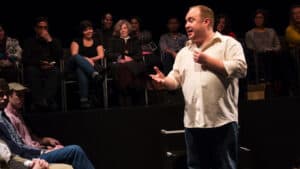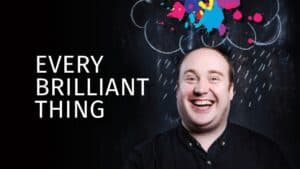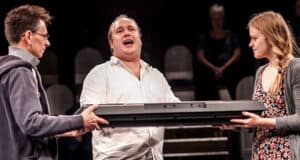I’m now halfway through my Arts Council and Peggy Ramsay Foundation-funded Protected Time to Write project. This is blog 6 in a series of 10 tracking a playwright’s process from initial ideas to first draft, in a bid to share some of the learning that’s coming out of it.
You can click on the links here for Blog 1, Blog 2, Blog 3, Blog 4 and Blog 5.
Blog 6 first appeared on Lane’s List on June 29th 2015.
Sometimes you see a play that you wish so badly that you’d written, you feel like you might as well stop trying because nobody’s ever going to do it better than that. Especially not you.
And for a short while, you do that horrible self-indulgent writerly thing of convincing yourself that everything you’re currently working on is simply a poor imitation of what you’ve just witnessed, and you may as well stop trying to finish because it’s clearly been done already.
Then – with any luck – you pull your brain out of your backside and do what any of us probably should do after a phenomenal night out at the theatre (because that’s really what we’re talking about here) and ask what you should take away from it. What you can nick from it, to be basic. Not plagiarism of content, but understanding of dramaturgy.
This alongside realising that nobody out there has nicked your voice, stolen your play, written your idea better than you, usurped your imaginative faculties etc, etc…
The play was Every Brilliant Thing by Duncan Macmillan. The story of how a seven year-old boy combats his mother’s depression and attempted suicide by writing her a list – the content of which is suggested by the title.
This list re-emerges during his mother’s second suicide attempt, when he’s seventeen, then again by chance when swapping old books with his future wife at university (one of which has the list folded up and hidden within it), then once more when he succumbs to depression himself and subsequently discovers his mother has successfully taken her life. Shortly after which, the list has grown to one million brilliant things and his Dad reads it, achieving a moment of rare connection with his son.
This one-person play is performed in the round without set and without costume. There’s a playlist of around four or five songs from which we hear brief snippets, a handful of props (an electric piano, some items borrowed from the audience, some children’s drawings) and a fistful of additional characters, each playfully cast from the watching spectators with a childish glee that’s impossible to resist.
We’re gently coerced, kindly held, given things to say and do, and always made safe. From the outset, this is a piece that cannot exist without its audience engaging in a collective contract of play and imagination. It’s nothing I hadn’t seen before – the work of Tim Crouch is very similar in its theatrical premise – but this was gentler, more intimate, a little more loose and friendly around the edges.
Because of these simple choices, its form celebrates what its content explores – the power of the human imagination in attempting to combat the darkest recesses of the human soul. If someone draws attention to what makes life brilliant, how can it possibly not be brilliant? Why would you still want to kill yourself?
Fortunately, the writing isn’t naïve enough to suggest the imagination can always win. Some things are darker and more mysterious than we can ever know.
The mother dies. The character is still in his depression at the end, the kind and warm relationship with his wife that we watched blossom in a university library now reduced to a sympathetic friendship. But there are a million brilliant things woven around them and – at some point in the future – we believe that they’ll remember to see them again. As the Dad in the story reminds us as his son constantly asks ‘why?’ at the news of his mother’s first attempt to kill herself: without our imagination, there is no better future for us to hope for.
So: great play, complex human themes and big questions, subtle dramaturgy, the joyful accidents of the live invitation to play and participate constantly buzzing around inside it, warmly performed and always reining in from the sentimental when it needed to – this was fantastic ‘poor theatre’. Him, us, and a delicate membrane holding us all together: a bare stage but a very, very full room.
I loved this play. I stood for the first time at the end of a performance since I witnessed the carnival revelry and deep emotion of Kneehigh’s Tristan and Yseult at the National Theatre in 2005 (yes, it’s taken that long. It takes a lot to get me up).
Beyond the dramaturgy described above however, there are also personal reasons why it grabbed me. My wife has had to cope with severe depression. We’ve just had our second child, and I worry (very occasionally) about whether these things are hereditary. I recognised the journey of the boy, bearing witness to somebody living with depression and trying to understand something that seems unfathomable to one’s self. Understanding objectively what it is, but being completely unable to know the experience inside.
This wasn’t going to start as one of my Arts Council project blogs but it’s become the sixth one now, because I know that that my reaction (see intro above) was also tied up with the progress of that play. I began writing my script in the afternoon before seeing Macmillan’s play, and felt immediate relief. I knew what I was doing, where I was going. It was slow writing, but that was because an enormous amount was now being distilled into what the characters were doing.
Just to re-cap – I have created an entire fictional nation. I have thirteen characters and ten actors. I have invented a creation myth for this nation. I know its 3,000 year history and its key cultural and political shifts along this time. I know the stories that bind it together, the lies its people have been told, the narratives that have been spun to coerce, control and manipulate them. I’m taking it from a point of civilisation to a point of internal collapse and rebirth. I am balancing the story of a civilian woman, who wants to confront the President about the murder of her child at his hands, with twelve other developing arcs and voices. Its style is largely realism, with a heightened mythic world as a backdrop. Audiences will watch it, not be in it. It’s a play. A drama. It’s conventional. I wanted to write a play.
Then I see an interactive theatrical one-man show on a bare stage like Every Brilliant Thing, which pushes all my emotional and professional buttons and feel I’m so, so far from having created something that is close to myself, to my desire for what theatre can do: create simple, clean, inviting ideas through spinning beautiful language, and creating structures with big yawning gaps for the audience’s imaginations to delve into.
If I feel like I did about Macmillan’s play, why am I creating the complete opposite?
From the time of the ACE application (and before that too) the question had been set loud and clear: what is your voice? It’s a question that unfolds in numerous ways: what’s the story only you can tell? What are you bringing of yourself to this idea? Why do you care? What’s the sort of play you’d want to go and see? What’s the unique way in which you experience the world, that can transform itself into decisions about content and structure? What is your signature style?
When we pick up a Beckett, Crouch, Brecht, Bartlett, Kane or Churchill we can sense those things immediately. As a writer I’ve been a bit of a chameleon, so identifying my own dramaturgical patterns and personal depths seems pretty important. Last night, the chasm between Macmillan’s work, my response, and what I’d just started scripting seemed indicative of a process gone hugely wayward.
I remember after the research period, that the ‘Macmillan’ or ‘Crouch’ version of this play was at my fingertips. I could touch it, taste it, smell it, and see it on stage in my head. I was very excited about it. And then I was challenged to look beyond what I knew I could do, to think much, much bigger in scale but try to retain the heart of what typified my answers to those questions above about my voice. Last night, I genuinely felt I should have just written that one. Instead I am writing a very expensive play, that I don’t quite have control of yet, that I sometimes struggle to find myself in. Why? What’s the point in that?
Now it’s the morning after the night before, and I’ve gone back to my treatment and first couple of scenes. I’m a big believer in listening to those things that remain after notes session, performances, experiences in the theatre. And the thing that stuck from last night was that conversation between the son and his Dad about why we need imaginations – because without them, we couldn’t create a better future to hope for.
A similar principle popped up in Simon Stephens’ online Bruntwood workshop, where participants were asked to identify what it is that makes humans different from other animals. We have the capacity to imagine ourselves into different times, spaces, futures and worlds: to position ourselves in relation to our past, present and future and wish for change.
Tracking back over my character journeys, the principle I pulled in from my Crouch/Macmillan version of the play was the same one: that every character in this play has a story they are imagining themselves into which is interrupted, damaged or destroyed, and out of which they create something new. They lose or sacrifice that which is most precious to themselves but, in doing so, they give birth to an attempt to transform their future stories.
That’s what I believe in: the human ability to tell ourselves different stories about our futures, even when the present seems unliveable. It’s how we survive. It’s even at the heart of this nation’s creation myth – a metaphor, burning brightly throughout.
I am writing Macmillan’s play. And my play. And I have put myself in it.
And now I’m going to shut up and keep writing.



